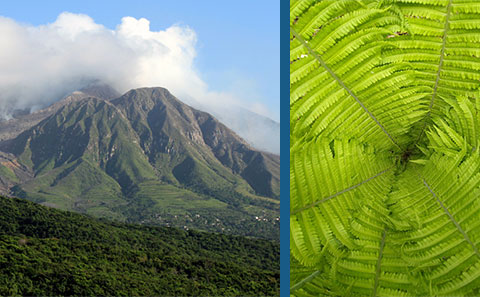
Scientists at the University of Southampton have discovered that the evolution of land plants caused a sudden shift in the composition of Earth's continents.
The Southampton researchers, led by Dr Tom Gernon, working with Queen's University Canada, led by Dr Christopher Spencer, and colleagues at the University of Cambridge, the University of Aberdeen, and the China University of Geosciences, Wuhan, studied the effects of land plant evolution on Earth's chemical composition over the past 700 million years.
The researchers' findings are published in the journal Nature Geoscience.
The evolution of land plants took place about 430 million years ago during the Silurian Period, when North America and Europe were conjoined in a landmass called Pangaea.
The proliferation of plants completely transformed Earth's biosphere – those parts of the planet's surface where life thrives – paving the way for the advent of dinosaurs about 200 million years later.
"Plants caused fundamental changes to river systems, bringing about more meandering rivers and muddy floodplains, as well as thicker soils," says Dr Christopher Spencer, Assistant Professor at Queen's University in Kingston, Ontario, lead author of the study. "This shift was tied to the development of plant rooting systems that helped produce colossal amounts of mud (by breaking down rocks) and stabilised river channels, which locked up this mud for long periods."
The team recognised that Earth's surface and deep interior are linked by plate tectonics – rivers flush mud into the oceans, and this mud then gets dragged into the Earth's molten interior (or mantle) at subduction zones where it gets melted to form new rocks.
"When these rocks crystallise, they trap in vestiges of their past history," says Dr Tom Gernon, Associate Professor of Earth Science at the University of Southampton and co-author of the study. "So, we hypothesised that the evolution of plants should dramatically slow down the delivery of mud to the oceans, and that this feature should be preserved in the rock record – it's that simple."
To test this idea, the team studied a database of over five thousand zircon crystals formed in magmas at subduction zones – essentially 'time capsules' that preserve vital information on the chemical conditions that prevailed on Earth when they crystallised.
The team uncovered compelling evidence for a dramatic shift in the composition of rocks making up Earth's continents, which coincides almost precisely with the onset of land plants.
Notably, the scientists also found that the chemical characteristics of zircon crystals generated at this time indicate a significant slowing down of sediment transfer to the oceans, just as they had hypothesised.
The researchers show that vegetation changed not only the surface of the Earth, but also the dynamics of melting in Earth's mantle.
"It is amazing to think that the greening of the continents was felt in the deep Earth," concludes Dr Spencer.
"Hopefully this previously unrecognised link between the Earth's interior and surface environment stimulates further study."






